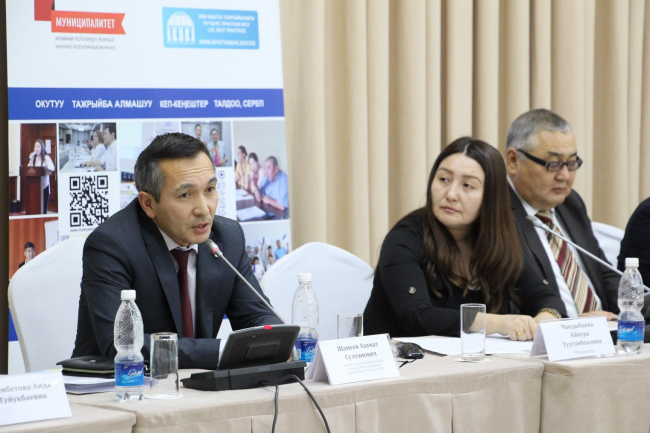What prevents municipal employees and deputies of local keneshes in Kyrgyzstan from improving their qualifications?

Administrative-territorial reform will pose new challenges for municipal employees. And although the legislation of Kyrgyzstan creates conditions for their training and advanced training, questions remain. But the biggest question arises regarding the deputies of local councils, of whom there are 8,722 people in the country. Unfortunately, there is no mechanism for training and advanced training for people’s deputies locally. Although the quality of life in communities often depends on their level of knowledge, since they adopt the budget, and development program, approve tariffs and services, and so on. To discuss options for solving the problem, the Local Governance Academy of Central Asia will hold an event on October 27 in Bishkek, where representatives of government agencies, local self-government bodies, international organizations, universities, NGOs, and other interested parties will gather.
“Based on the Regulations on the procedure for training state civil servants and municipal employees of the Kyrgyz Republic, they undergo training to improve their qualifications. But at the same time, according to the Law of the Kyrgyz Republic “On State Civil Service and Municipal Service”, training for deputies of local councils is not provided, since this resolution applies only to administrative state and municipal employees. Training of citizens holding political state and municipal positions, at the suggestion of the Administration of the President of the Kyrgyz Republic, is sometimes organized by international partners within the framework of various projects and programs. Recently, this number has been replenished with another institution that has a license to improve the professional qualifications of municipal employees and deputies of local councils. Since June 2023, the of Local Governance Academy of Central Asia (LGACA) has launched the first courses in advanced training programs for municipal employees and deputies of local councils on a paid basis. For our part, we express our readiness to cooperate with you to further improve and increase the efficiency of the system in this area,” - said Murat Baydyldaev, Deputy Director of the State Agency for Civil Service Affairs and Local Self-Government under the Cabinet of Ministers of the Kyrgyz Republic.
“The courses we conduct on local self-government (LSG) each time confirm the need for LSG bodies to constantly improve the skills of not only municipal employees but also deputies of local councils so that they can make appropriate management decisions on issues of local importance. Since today in the Kyrgyz Republic, the system of advanced training of municipal employees in departmental areas is at the stage of formation, in the course of our activities we have identified problems and gaps in the legal acts. For example, there is no specific standard for improving the skills or potential of deputies of local keneshes at the expense of the local budget, and deputies of local keneshes have to study at their own expense. But not all deputies have such an opportunity, especially since deputies work voluntarily,” - said Asel Kurmanalieva, director of LGACA.
Based on the results of the discussion, a resolution will be adopted, which will be sent to the State Agency for Civil Service and Local Self-Government under the Cabinet of Ministers of the Kyrgyz Republic, deputies of the Jogorku Kenesh of the Kyrgyz Republic and other relevant departments to study the possibilities of creating a mechanism for financing training for local deputies. However, the discussion participants will also raise other issues, including the need to have training programs for municipal employees in each local self-government body. The relevance of the issue has increased in connection with the administrative-territorial reform, as a result of which larger municipalities will require more qualified and highly specialized employees, instead of the large number of “generalists” who work in local self-government bodies today.
Frequent changes in legislation, brain drain in municipalities, and the inclusion of more and more new functions and obligations to local self-government bodies without providing finances and basic knowledge increase their need to improve their skills regularly. Having studied the needs in this area, the Academy of Local Government of Central Asia (AMUCA) has developed several advanced training programs for municipal employees and deputies of local councils, and since June of this year has been regularly training deputies of local councils and employees of city mayors and aiyl okmotu. To date, about 1,300 people have improved their qualifications on a paid basis, including municipal employees, deputies of local councils, and local activists.
The event is supported by Switzerland within the framework of the Program of the Coalition “For the Development of Local Self-Government of the Kyrgyz Republic”1.
___________
1 The program “Coalition “For the Development of LSG in the Kyrgyz Republic” was created by the Development Policy Institute, the Union of Local Self-Governments of the Kyrgyz Republic, and the Academy of Local Government in Central Asia to support reforms in the field of local self-government and local development aimed at improving the living conditions of local communities and is being implemented with financial support from Switzerland.

